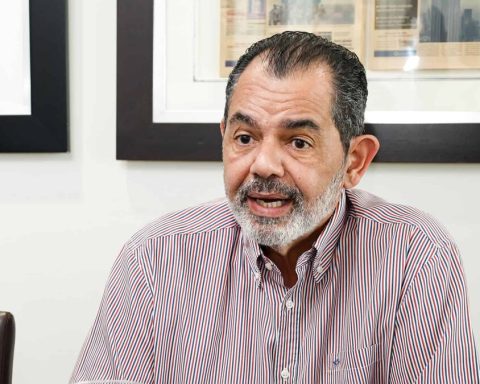One of the cursed legacies left by the pandemic in Colombia was the growth of operating expenses, which at the time had to be increased to meet the needs of households and social sectors that were hit by this phenomenon, generating strong pressures on the accounts of the Nation and forcing the governments in power to find money to comply.
Since 2020, when the country had to lock itself down to deal with the threat Since the outbreak of Covid-19, operating expenses (in current prices) have so far increased from $211.8 billion to $308.8 billion, which represents a 46% increase over the past five years. However, it should be noted that investment has grown by 128% over the same period, from $43.7 billion to $99.8 billion.
For reading: Banco de la República lowered interest rates by 50 bps and left them at 10.75%
If we add to this the proposal made by the Ministry of Finance, that in 2025 $327.4 billion will be allocated to the operation of the State, the growth of this item would be $115.5 billion compared to five years ago, that is, an increase of 54.5%. This while investment will suffer a cut to $82.4 billion, of which at least $12 billion will depend on a Financing Law, which will be presented to Congress.
Colombian pesos
iStock
Subsidies put pressure
A recent report from the Fiscal Observatory of the Universidad Javeriana reviewed the changes in the operating expenses of the National Government between 2019 and 2024, finding that most of the increases that have been made, they comply with the commitment made with current transfers.
“For this period, this type of expenditure grew by approximately $87.5 billion in constant pesos, representing an increase of 40% and 5.5% of the GDP projected for 2024. This growth was concentrated mainly in the current transfers account (82%), followed by personnel expenses (14%) and to a lesser extent the rest of the accounts (4%),” they indicated in their report.
In other news: Petro admits there are ‘serious doubts’ surrounding the electoral process in Venezuela
This, put another way, shows that beyond thinking that you are hiring to many people or that representation and supplier expenses generate a strong weight in the calculations, Most of the pressure comes from the aid and subsidies that are being given to different sectors of society.
However, in the breakdown of transfers, those that have had the greatest weight over the last five years are those from the Fuel Price Stabilization Fund (Fpec), with 26%, followed by the General Participation System (subsidies in the regions), which covers 19%, and in third place the transfers to the health system, with another 19%.

Colombian economy.
iStock
This list also includes social benefits provided by the State (health and pensions), for which $13.2 billion had to be allocated between 2019 and 2024, that is, 18% of the increase in expenditure. Finally, there are “other current transfers”, which are laws that order some allocation for subnational governments, funds or private entities that manage public resources. to finance social spending and accounts for 17% of the growth in the operating sector.
Perfect storm
Taking into account all that has already been mentioned and that, contrary to what experts have been recommending, operating expenses will continue to grow, while debt commitments put pressure on finances and investment falls, it can be said that the country is heading towards a kind of “debt storm”, in which its obligations give no respite, while economic growth remains slow.
More information: Without investment there is no growth and the regions can help: Grupo Aval
Portafolio also spoke with William Reyes, researcher at the Javeriana Fiscal Observatory, He recalled that Colombia is in a time of fiscal constraints, in which all expenses must be reviewed, to postpone those that are not urgent and give priority to the cash relief that is urgently needed.
“The government has had to cut $20 billion from this year’s budget, basically because there is no way to finance it, and it is likely that over the course of the next few months it will have to make even more cuts. In scenarios like these, the type of expenditure or component that is mainly affected is investment, and that clearly has consequences for economic growth and implies a lower supply of public goods and services for citizens and regions in general,” said this expert.

The Government’s project includes minimum health and safety indicators for workers at work.
Archive/Time
Reyes added that these transfers do not depend on decisions of the executive branch, but rather obey constitutional or legal norms and that in practice there is not much room for maneuver to reduce a good part of these transfers.at least in the short term, which means that we must consider making small adjustments to alleviate spending.
“Here we must also talk about the debt, because it is something that cannot be cut when they make the Budget, here in the Government they do not have much room for maneuver or any degree of discretion to reduce or suspend. What is promised must be paid and that is why it is not viable to think that those lines will be touched,” he said.
Optimize spending
These experts presented several proposals to better deal with this squeeze. cash flow, starting by granting greater autonomy to territorial entities in the management of resources from the General Participation System (SGP), so that they develop their capacities to generate their own income through local taxes, reducing their dependence on national transfers and improving efficiency in the use of public resources.
You may be interested in: Fitch Ratings maintains Colombia’s credit rating at BB+ with a stable outlook
They also put on the table the possibility of introducing taxes on pensions, especially in special regimes that generate significant pressure on the public budget and benefit a limited number of people. In the area of health, they indicated that it is necessary to prioritize the treatments and services offered by the system, given that the available resources are limited.
Finally, they indicated that it is essential to narrow the definition of social spending, given that the current broad interpretation has allowed the proliferation of laws that mandate spending with the qualification of “social” without considering its long-term sustainability, in order to focus resources on truly essential needs, ensuring greater effectiveness in solving the basic needs of the population.


















